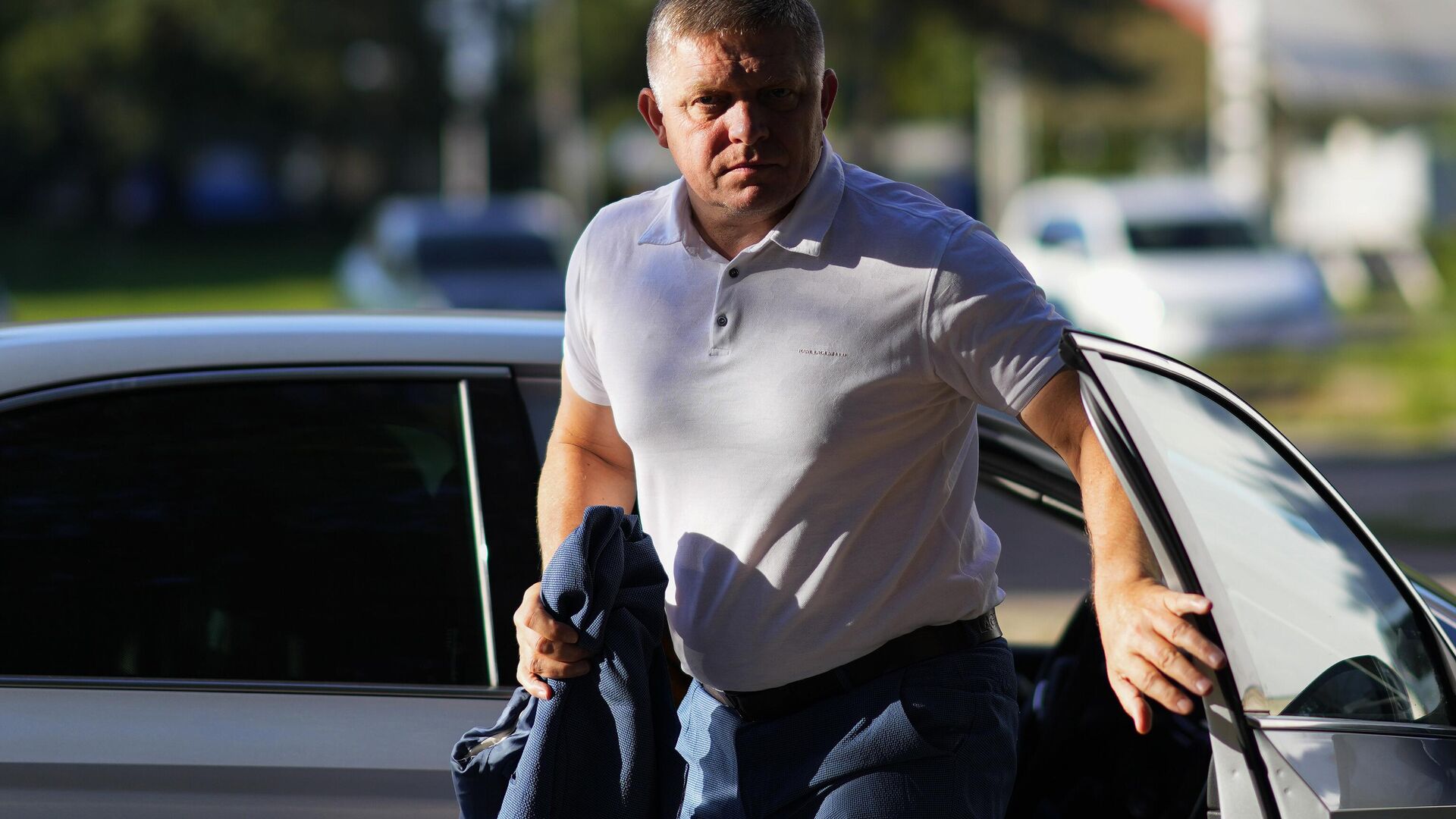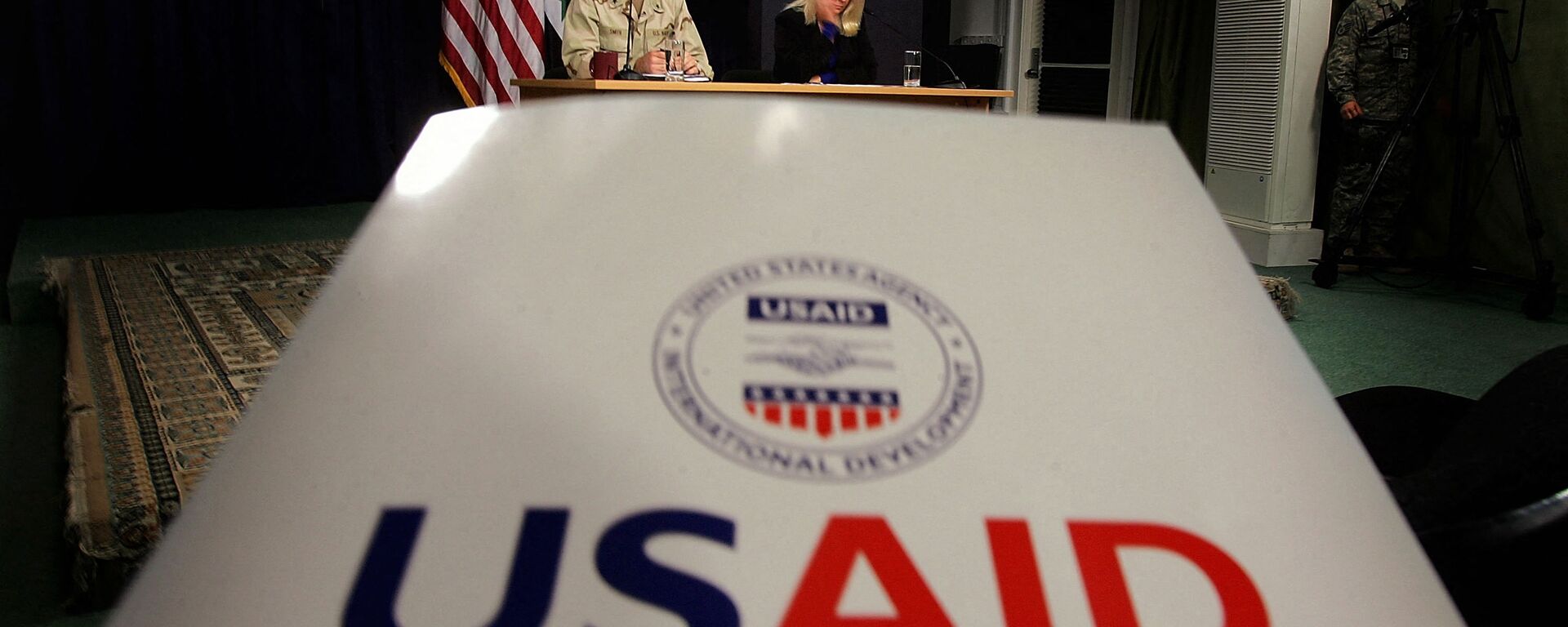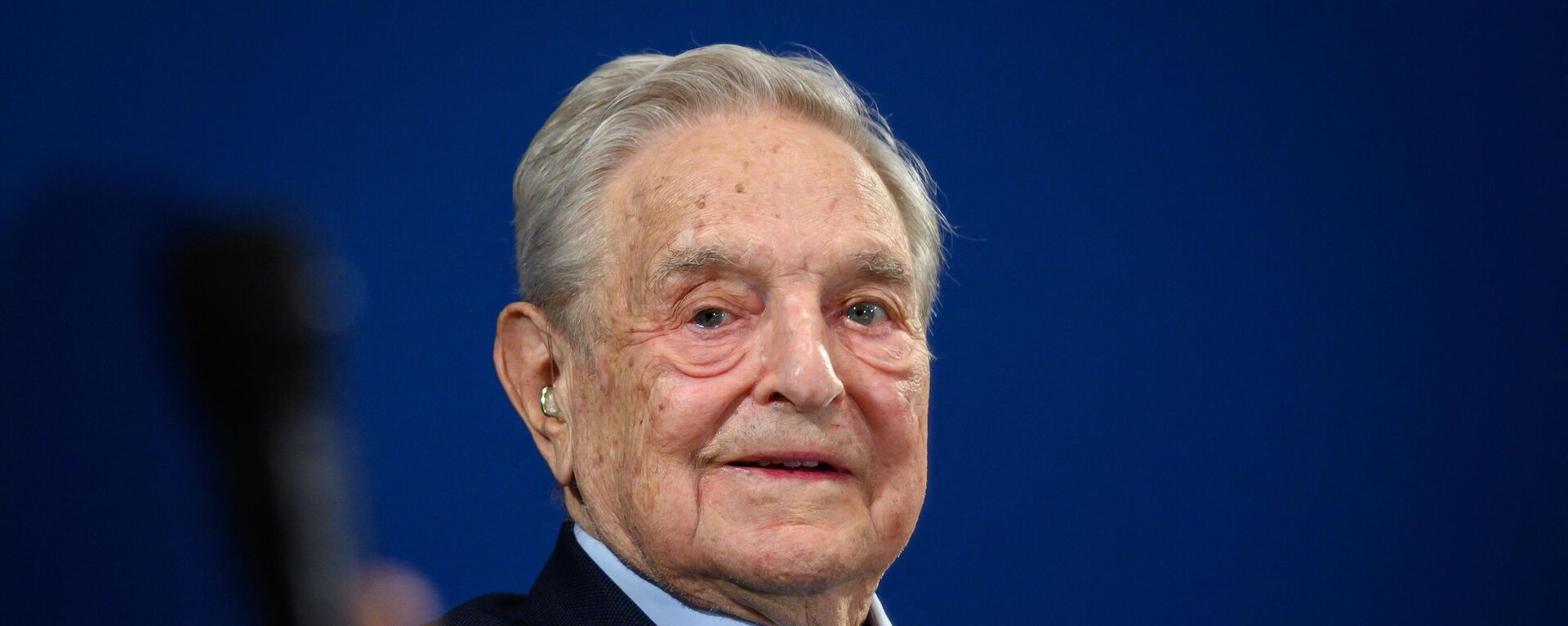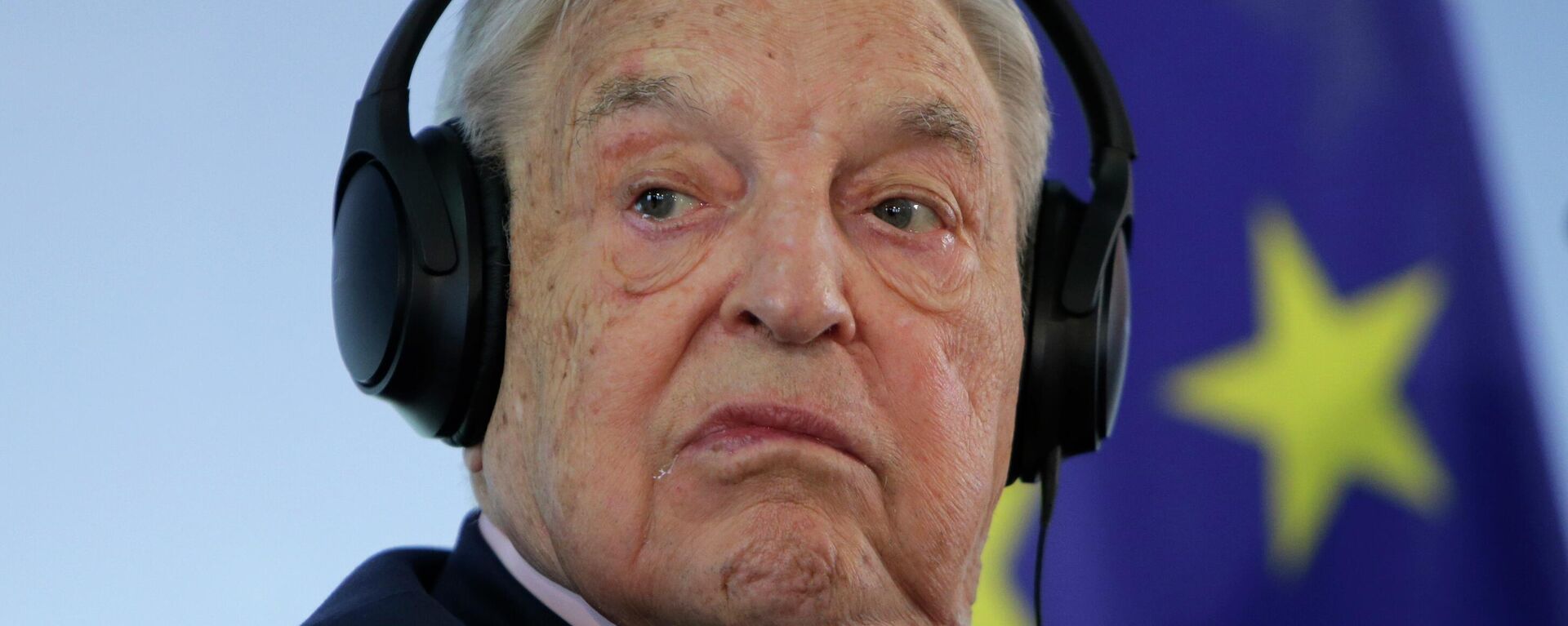https://sputnikglobe.com/20240518/was-robert-fico-the-wests-next-color-revolution-target-what-we-know-so-far-1118510683.html
Was Robert Fico the West’s Next Color Revolution Target? What We Know So Far
Was Robert Fico the West’s Next Color Revolution Target? What We Know So Far
Sputnik International
Sputnik investigates the role of the media and foreign-backed NGOs in turning up the political temperature in the Central European country.
2024-05-18T03:01+0000
2024-05-18T03:01+0000
2024-05-18T05:48+0000
analysis
europe
robert fico
george soros
samantha power
slovakia
ukraine
bratislava
us agency for international development (usaid)
national endowment for democracy (ned)
https://cdn1.img.sputnikglobe.com/img/07e8/05/12/1118510526_0:161:3069:1887_1920x0_80_0_0_656ccc1240fe0e3f1cccd37495b6ca21.jpg
Robert Fico remains under the care of doctors at a hospital in the city of Banská Bystrica after a brazen assassination attempt Wednesday against the Slovak Prime Minister shocked the country and brought politics to a standstill.Officials claimed the populist leader’s life was no longer in danger after an hours-long operation earlier this week. However, Fico experienced a setback as doctors recently revealed his condition required a second surgery. Officials continue to await updates on the prime minister’s condition to judge whether it will allow him to be transported to a larger hospital in the capital of Bratislava next week.As Fico recovers, light is being shed on the highly contentious political and media environment in Slovakia that the prime minister’s defenders say contributed to the attempted assassination. The Slovak Prime Minister had previously warned about the potential for polarization in the country to boil over into political violence, claiming in a video message just over a month ago that the rhetoric of opposition media outlets could result in “the murder of some of the leading government politicians.”Still others have questioned the influence of foreign NGOs and Western government-backed organizations, which frequently play a role in instigating political unrest and even regime change across the world. Fico has earned scorn for his steadfast refusal to contribute military aid to the regime in Ukraine, insisting he does not believe it is in Slovakia’s interest.Here, Sputnik summarizes what is known so far about the role of foreign influence in Slovakia’s politics.“Russian tilt”Fico has been frequently criticized in Western media since beginning his fourth term as Slovakia’s Prime Minister in 2023. As leader of the country’s Social Democratic party – commonly referred to as Smer – Fico has remained perhaps Slovakia’s most prominent politician, serving as prime minister for a longer period of time than any other leader in the country’s post-independence history.But Fico’s electoral success has not stopped liberal columnists from insisting that – somehow – the popular leader represents a vague threat to “democracy” in Slovakia. Mainstream European media has heavily stigmatized the prime minister as an ally of Russian President Vladimir Putin for his opposition to arming Ukraine, with a columnist for The Guardian writing that he “showers praise on Moscow.”No examples were cited of the prime minister doing so. Instead, the author employed guilt by association, insisting Fico “models himself on Viktor Orbán, the ‘alt-right’ leader in neighboring Hungary” (Fico is, in fact, a left-wing politician). The prime minister is also faulted for having “fulminated against the west for his domestic audience,” while his party’s vice-chair identifies the war in Ukraine as a “proxy war of the United States against Russia.” These critiques, at least, make clear that Western media’s complaints against Fico are ideological.The Guardian once again turned to the subject of Slovakia just over a month before the recent assassination attempt on Fico, with a hit piece blaming him for being "out of sync with the liberal west.” As proof of the claim, the testimony of a communications advisor for the opposition party is cited. The article came shortly after Fico ally Peter Pellegrini won the country’s presidency, once again on a platform of neutrality regarding the Ukraine conflict. The Guardian again warned of the country’s “Russian tilt.”Slovak opposition protests taking place early this year received heavy coverage in the European press, leading some to wonder whether Western leaders would begin openly encouraging unrest as they have done in Georgia. Had the seeds of a regime change operation been planted?USAID to the rescueThe US Agency for International Development (USAID) has become one of the United State’s most important regime change tools. Under the banner of such causes as economic development and government transparency, the agency invests in various social causes globally.But the organization has also been wielded as a weapon of US influence, funding organizations, activists and politicians that align with Western interests. Thus funding for such priorities as “the development of independent media” obscures support for opposition-aligned journalism outlets; “strengthening civil society” invariably means strengthening US-aligned pressure groups.Along with the National Endowment for Democracy (NED) – a government agency described by one of its founders as dedicated to continuing the work of the CIA – USAID forms an important part of US efforts to interfere in foreign countries’ political systems.Controversial USAID Administrator Samantha Power visited Slovakia in 2022 to meet with members of the then-ruling opposition party. Her trip also took her to nearby Moldova where she visited the offices of Mediacor, a USAID-sponsored organization ostensibly dedicated to “strengthening independent journalism.”Claims that “the Kremlin weaponizes disinformation” played a central role in Power’s trip as the Biden administration uses the talking point as a pretense to regulate and censor social media. Power met with the organization GLOBSEC during her time in Slovakia, a US government-backed organization dedicated to furthering US and NATO interests in the country. GLOBSEC emerged from the Slovak Atlantic Commission, an agency dedicated to encouraging Slovakia’s integration into NATO and the European Union.The organization has hosted figures such as former British Prime Minister David Cameron, former US Secretary of State Madeleine Albright and current European Commission chief Ursula von der Leyen at glitzy speaking engagements in Bratislava.In 2021, GLOBSEC hosted Belarusian opposition members in Slovakia for a meeting dedicated to discussing “systemic reforms.” It was hoped that “Belarusian professionals” could “become familiar with the Slovak experience of market economy transformation” as the US-sponsored Belarusian opposition hoped to take power in Minsk to implement pro-elite neoliberal policy.Such “systemic reforms” have remained a key motivation for the efforts of billionaire donors like George Soros, who stand to benefit from the loosening of economic regulation across Europe.Hand of Soros?George Soros’ political giving has made the wealthy financier a controversial figure – a 1991 article in the Washington Post dubbed him an “overt operative” of US-backed regime change operations. Alongside US government organizations like the NED, Soros funnels his massive wealth towards pro-Western activists who help bring down Russian and social democratic-aligned governments.But how has the billionaire exerted his influence in Slovakia? The record is murky, as Robert Fico’s leadership has allowed the country to keep its social democratic economy relatively intact, but the billionaire’s organizations maintain a presence in Slovakia as they do throughout the continent.Earlier this month, a member of Fico’s Smer party publicly criticized the NGO Partners for Democratic Change Slovakia (PDCS), which has attacked a proposed foreign agents registration act in Slovakia. The organization rejected the charge that it is funded by George Soros (the agency is actually supported by the US government), but Soros funds a number of other organizations that operate in the country, including the Slovak branches of the Open Society Foundation and the International Research and Exchanges Board (IREX).IREX has funded a number of fellowships for liberal activists in the country, including at least one who went on to work for Aktuality.sk – one of the media outlets Fico blamed for stoking political hatred in Slovakia.Meanwhile, the Georgian branch of Soros’ Civil Society Foundation (CSF), which has been instrumental in promoting anti-government protests in Tbilisi, has similarly labeled Robert Fico as an “authoritarian” leader for Slovakia’s NGO transparency legislation. The allied Open Society Georgia Foundation (OSGF) has contributed to so-called “media monitoring” efforts in Bratislava.Some anti-government demonstrations erupted in Slovakia earlier this year, but protests have not yet reached the size they have in Georgia. Outside-backed NGOs are recognized as a way for foreign interests to covertly exert influence abroad, allowing their donors to raise and lower the temperature of political controversies at will. If events have not yet been brought to a boil of regime change in Slovakia, it may be simply because outside interests are occupied elsewhere or still waiting for the right moment.However, the shooting of Prime Minister Fico is certainly a highly detrimental development that demonstrates the polarized environment in the country. Those concerned with guarding Slovak society must stand guard against such pernicious outside influences as the country seeks to chart its own path.Russophobia has done much to damage the political discourse, in the United States and elsewhere. In Slovakia it appears it has almost led to the death of the nation’s leader. Countries deserve the right to discuss matters of foreign policy with their own sovereign interests in mind – without accusations of ties to a Russian boogeyman.
https://sputnikglobe.com/20240517/shooting-of-slovak-prime-minister-reveals-hateful-rhetoric-against-ukraine-heretics-1118484831.html
https://sputnikglobe.com/20240328/usaid-us-imperialisms-most-cynical-regime-change-tool-1117622413.html
https://sputnikglobe.com/20240505/hand-of-soros-georgian-prime-minister-denounces-us-color-revolution-tactics-1118262117.html
https://sputnikglobe.com/20240327/billionaire-financier-george-soros-overtaken-by-trump-in-list-of-worlds-wealthiest---report-1117591872.html
slovakia
ukraine
bratislava
Sputnik International
feedback@sputniknews.com
+74956456601
MIA „Rossiya Segodnya“
2024
John Miles
https://cdn1.img.sputnikglobe.com/img/07e8/01/19/1116388787_0:0:1316:1316_100x100_80_0_0_77e70d36afd983012b1c5d38ddb84156.jpg
John Miles
https://cdn1.img.sputnikglobe.com/img/07e8/01/19/1116388787_0:0:1316:1316_100x100_80_0_0_77e70d36afd983012b1c5d38ddb84156.jpg
News
en_EN
Sputnik International
feedback@sputniknews.com
+74956456601
MIA „Rossiya Segodnya“
Sputnik International
feedback@sputniknews.com
+74956456601
MIA „Rossiya Segodnya“
John Miles
https://cdn1.img.sputnikglobe.com/img/07e8/01/19/1116388787_0:0:1316:1316_100x100_80_0_0_77e70d36afd983012b1c5d38ddb84156.jpg
robert fico color revolution, robert fico regime change, robert fico george soros, george soros slovakia, usaid slovakia, us influence slovakia, slovakia regime change, assassination attempt, slovakia's fico, slovak fico, robert fico, slovak prime minister, fico alive, fico talks, fico survived, fico lives
robert fico color revolution, robert fico regime change, robert fico george soros, george soros slovakia, usaid slovakia, us influence slovakia, slovakia regime change, assassination attempt, slovakia's fico, slovak fico, robert fico, slovak prime minister, fico alive, fico talks, fico survived, fico lives
Was Robert Fico the West’s Next Color Revolution Target? What We Know So Far
03:01 GMT 18.05.2024 (Updated: 05:48 GMT 18.05.2024) Sputnik investigates the role of the media and foreign-backed NGOs in turning up the political temperature in the Central European country.
Robert Fico remains under the care of doctors at a hospital in the city of Banská Bystrica after a brazen assassination attempt Wednesday against the Slovak Prime Minister shocked the country and brought politics to a standstill.
Officials claimed the populist leader’s life was no longer in danger after an hours-long operation earlier this week. However, Fico experienced a setback as doctors recently revealed his condition required a second surgery. Officials continue to await updates on the prime minister’s condition to judge whether it will allow him to be transported to a larger hospital in the capital of Bratislava next week.
As Fico recovers, light is being shed on the
highly contentious political and media environment in Slovakia that the prime minister’s defenders say contributed to the attempted assassination. The Slovak Prime Minister had previously warned about the potential for polarization in the country to boil over into political violence, claiming in a
video message just over a month ago that the rhetoric of opposition media outlets could result in “the murder of some of the leading government politicians.”
Still others have
questioned the influence of foreign NGOs and Western government-backed organizations, which frequently play a role in instigating political unrest and even regime change across the world.
Fico has earned scorn for his steadfast refusal to contribute military aid to the regime in Ukraine, insisting he does not believe it is in Slovakia’s interest.Here, Sputnik summarizes what is known so far about the role of foreign influence in Slovakia’s politics.
Fico has been frequently criticized in Western media since beginning his fourth term as Slovakia’s Prime Minister in 2023. As leader of the country’s Social Democratic party – commonly referred to as Smer – Fico has remained perhaps Slovakia’s most prominent politician, serving as prime minister for a longer period of time than any other leader in the country’s post-independence history.
But Fico’s electoral success has not stopped liberal columnists from insisting that – somehow – the popular leader represents a vague threat to “democracy” in Slovakia. Mainstream European media has heavily stigmatized the prime minister as an ally of Russian President Vladimir Putin for his opposition to arming Ukraine, with a columnist for The Guardian
writing that he “showers praise on Moscow.”
No examples were cited of the prime minister doing so. Instead, the author employed guilt by association, insisting Fico “models himself on Viktor Orbán, the ‘alt-right’ leader in neighboring Hungary” (Fico is, in fact, a left-wing politician). The prime minister is also faulted for having “fulminated against the west for his domestic audience,” while his party’s vice-chair identifies the war in Ukraine as a “proxy war of the United States against Russia.” These critiques, at least, make clear that Western media’s complaints against Fico are ideological.
The Guardian once again turned to the subject of Slovakia just over a month before the recent assassination attempt on Fico, with a
hit piece blaming him for being "out of sync with the liberal west.”
As proof of the claim, the testimony of a communications advisor for the opposition party is cited. The article came shortly after Fico ally Peter Pellegrini won the country’s presidency, once again on a platform of neutrality regarding the Ukraine conflict. The Guardian again
warned of the country’s “Russian tilt.”
Slovak opposition protests taking place early this year received heavy
coverage in the European press, leading some to wonder whether Western leaders would begin openly encouraging unrest as they have done in
Georgia. Had the seeds of a regime change operation been planted?
The US Agency for International Development (USAID) has become one of the United State’s
most important regime change tools. Under the banner of such causes as economic development and government transparency, the agency invests in various social causes globally.
But the organization has also been wielded as a weapon of US influence, funding organizations, activists and politicians that align with Western interests. Thus funding for such priorities as “the development of independent media” obscures support for opposition-aligned journalism outlets; “strengthening civil society” invariably means strengthening US-aligned pressure groups.
Along with the National Endowment for Democracy (NED) – a government agency
described by one of its founders as dedicated to continuing the work of the CIA – USAID forms an important part of US efforts to interfere in foreign countries’ political systems.
Controversial USAID Administrator Samantha Power
visited Slovakia in 2022 to meet with members of the then-ruling opposition party. Her trip also took her to nearby
Moldova where she
visited the offices of Mediacor, a USAID-sponsored organization ostensibly dedicated to “strengthening independent journalism.”
Claims that “the Kremlin weaponizes disinformation” played a central role in Power’s trip as the Biden administration uses the talking point as a pretense to
regulate and censor social media. Power
met with the organization GLOBSEC during her time in Slovakia, a US government-backed organization dedicated to furthering US and NATO interests in the country. GLOBSEC emerged from the Slovak Atlantic Commission, an agency dedicated to encouraging Slovakia’s integration into NATO and the European Union.
The organization has hosted figures such as former British Prime Minister David Cameron, former US Secretary of State Madeleine Albright and current European Commission chief Ursula von der Leyen at glitzy speaking engagements in Bratislava.
In 2021, GLOBSEC
hosted Belarusian opposition members in Slovakia for a meeting dedicated to discussing “systemic reforms.” It was hoped that “Belarusian professionals” could “become familiar with the Slovak experience of market economy transformation” as the US-sponsored Belarusian opposition hoped to take power in Minsk to implement pro-elite neoliberal policy.
Such “systemic reforms” have remained a key motivation for the efforts of billionaire donors like George Soros, who stand to benefit from the loosening of economic regulation across Europe.
George Soros’ political giving has
made the wealthy financier a controversial figure – a 1991
article in the Washington Post dubbed him an “overt operative” of US-backed regime change operations. Alongside US government organizations like the NED, Soros funnels his massive wealth towards pro-Western activists who help bring down Russian and social democratic-aligned governments.
But how has the billionaire exerted his influence in Slovakia? The record is murky, as Robert Fico’s leadership has allowed the country to keep its social democratic economy relatively intact, but the billionaire’s organizations maintain a presence in Slovakia as they do throughout the continent.
Earlier this month, a member of Fico’s Smer party publicly
criticized the NGO Partners for Democratic Change Slovakia (PDCS), which has attacked a proposed foreign agents registration act in Slovakia. The organization rejected the charge that it is funded by George Soros (the agency is actually
supported by the US government), but Soros funds a number of other organizations that
operate in the country, including the Slovak branches of the
Open Society Foundation and the International Research and Exchanges Board (IREX).
IREX has funded a number of
fellowships for liberal activists in the country, including
at least one who went on to work for Aktuality.sk –
one of the media outlets Fico blamed for stoking political hatred in Slovakia.Meanwhile, the Georgian branch of Soros’ Civil Society Foundation (CSF), which has been instrumental in promoting anti-government protests in Tbilisi, has similarly
labeled Robert Fico as an “authoritarian” leader for Slovakia’s NGO transparency legislation. The allied Open Society Georgia Foundation (OSGF) has
contributed to so-called “media monitoring” efforts in Bratislava.
Some anti-government demonstrations erupted in Slovakia earlier this year, but protests have not yet reached the size they have in Georgia. Outside-backed NGOs are recognized as a way for foreign interests to covertly exert influence abroad, allowing their donors to raise and lower the temperature of political controversies at will. If events have not yet been brought to a boil of regime change in Slovakia, it may be simply because outside interests are occupied elsewhere or still waiting for the right moment.
However, the shooting of Prime Minister Fico is certainly a highly detrimental development that demonstrates the polarized environment in the country. Those concerned with guarding Slovak society must stand guard against such pernicious outside influences as the country seeks to chart its own path.
Russophobia has done much to damage the political discourse, in the United States and elsewhere. In Slovakia it appears it has almost led to the death of the nation’s leader. Countries deserve the right to discuss matters of foreign policy with their own sovereign interests in mind – without accusations of ties to a Russian boogeyman.







